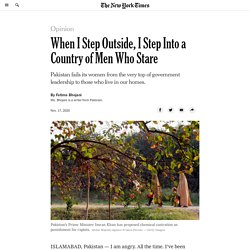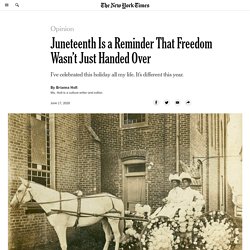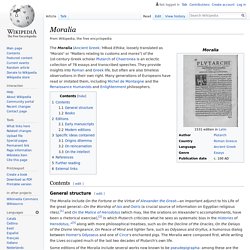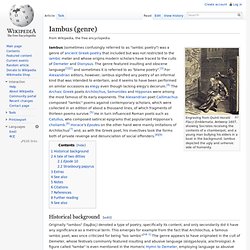

Why Is Every Young Person in America Watching ‘The Sopranos’? When I Step Outside, I Step Into a Country of Men Who Stare. An elderly woman in my apartment building in Islamabad, remarked, “Apni izzat apnay haath mein” — Your honor is in your own hands.

In Pakistan, sexual assault comes with stigma, the notion that a woman by being on the receiving end of a violent crime has brought shame to herself and her family. Societal judgment is a major reason survivors don’t come forward. Responding to the Lahore assault, Prime Minister Imran Khan proposed chemical castration of the rapists. His endorsement of archaic punishments rather than a sincere promise to undertake the difficult, lengthy and necessary work of reforming criminal and legal procedures is part of the problem. The conviction rate for sexual assault is around 3 percent, according to War Against Rape, a local nonprofit.
Mr. The highway attack shook the women of Pakistan, but it did not shock us. In the two months since the highway assault, a police officer raped a woman in her home. On a recent afternoon, I pulled up to a traffic stop. Cotton Patch Gospel. Using a southern reinterpretation of the gospel story, the musical is often performed in a one-man show format with an accompanying quartet of bluegrass musicians, although a larger cast can also be used.

A video recording of the play was released in 1988 with Tom Key as the leading actor. Plot[edit] The story begins with the story of a young couple. Juneteenth Is a Reminder That Freedom Wasn’t Just Handed Over. The entire celebration lasted only six hours but had the vitality to keep you feeling warm and loved throughout the summer.

It acted as a reminder that there was a community of people who were rooting for you, supported you and wanted to see you succeed. Every time you left a Juneteenth celebration, you took with you new stories, new connections and a new sense of what it meant to be black, but specifically what it meant to be black in Texas. As I watch predominantly white brands post their Black Lives Matter statements and sift through my emails from editors who finally are interested in my opinion, I remember everything I was told and overheard during Juneteeneth celebrations. “Never shop where you won’t get hired” and “Don’t let anyone tell you that you can’t do something” ring deep in my ears as I navigate embedding myself into this movement.
It’s also likely that this movement will lose its momentum as businesses begin to reopen and “normal life” makes its return. Culture - Every story in the world has one of these six basic plots. “My prettiest contribution to the culture” was how the novelist Kurt Vonnegut described his old master’s thesis in anthropology, “which was rejected because it was so simple and looked like too much fun”.

The thesis sank without a trace, but Vonnegut continued throughout his life to promote the big idea behind it, which was: “stories have shapes which can be drawn on graph paper”. In a 1995 lecture, Vonnegut chalked out various story arcs on a blackboard, plotting how the protagonist’s fortunes change over the course of the narrative on an axis stretching from ‘good’ to ‘ill’. The arcs include ‘man in hole’, in which the main character gets into trouble then gets out again (“people love that story, they never get sick of it!”) And ‘boy gets girl’, in which the protagonist finds something wonderful, loses it, then gets it back again at the end.
Moralia. The Moralia (Ancient Greek: Ἠθικά Ethika; loosely translated as "Morals" or "Matters relating to customs and mores") of the 1st-century Greek scholar Plutarch of Chaeronea is an eclectic collection of 78 essays and transcribed speeches.

They provide insights into Roman and Greek life, but often are also timeless observations in their own right. 69. My Lost Youth. Henry Wadsworth Longfellow. Yale Book of American Verse. God's Trombones. Seven Negro Sermons in Verse. God's Trombones: Seven Negro Sermons in Verse: Electronic Edition.

Johnson, James Weldon, 1871-1938. Drawings by Douglas, Aaron Lettering by Falls, C.B. (Charles Buckles), 1874-1960. Funding from the University of North Carolina Library supported the electronic publication of this title. Text transcribed by Apex Data Services, Inc. . © This work is the property of the University of North Carolina at Chapel Hill. Source Description: (title page) God's Trombones Seven Negro Sermons in Verse (cover) God's Trombones (spine) God's Trombones James Weldon Johnson Drawings by Aaron Douglas Lettering by C.B.
Call number J811 Johnson (School of Information and Library Science Library, University of North Carolina at Chapel Hill) The electronic edition is a part of the UNC-Chapel Hill digitization project, Documenting the American South. Library of Congress Subject Headings Languages Used: English LC Subject Headings: Revision History: [Cover Image] Iambus (genre) Engraving from Quinti Horatii Flacci Emblemata, Antwerp 1607, showing Socrates receiving the contents of a chamberpot, and a young man bullying his elders in a boat in the background.

Ozymandias. A fair copy draft (c. 1817) of Shelley's "Ozymandias" in the collection of Oxford's Bodleian Library Ozymandias (in five syllables /ˌɒziˈmændiəs/ or four syllables /ˌɒziˈmændjəs/)[1] is a sonnet written by the English romantic poet Percy Bysshe Shelley (1792–1822).

First published in the 11 January 1818 issue of The Examiner[2] in London, it was included the following year in Shelley's collection Rosalind and Helen, A Modern Eclogue; with Other Poems (1819)[3] and after his death in a posthumous compilation of his poems published in 1826.[4] Ozymandias is regarded as one of Shelley's most famous works and is frequently anthologised. Writing and publication history[edit] Publication history[edit] Smith's poem[edit] Comparison of the two poems[edit] Analysis and interpretation[edit] "I Am Sorry That It Has Come to This": A Soldier's Last Words. The paradox of how one person's life can take on staggering significance in the tidal wave of death that has soaked this country's troops is writ large here.

Mr. Somers, we owe you the apology, sir. It was our leaders (it hurts just to type that word in reference to the decision-makers that flung us into this business-venture-disguised-as-justified-military-action) who unleashed the war machine that catapulted you and thousands more across the abyss, only to shift the very ground on which you would land before you would even get there.
And if you had the lunatic good fortune to land intact, you were on your own. All bets were off, all promises withdrawn. Holcroft, "The Negro" The Charge of the Light Brigade (poem)